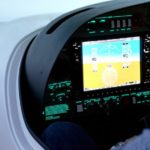Earlier this week, Flybe hosted the Women in Aviation and Aerospace Charter Seminar at its training academy in Exeter. We round up the day’s highlights.
Welcoming nearly 60 aviation and aerospace professionals, the day began with a tour of the Flybe training academy and aircraft hangar, where Flybe currently employs four full-time female engineers.
Others are coming up through the ranks in the coming months too, through the company’s apprentice scheme.
As engineering diploma graduate Sophia said: ‘What gets people ticking is the practical engagement – getting to actually do the role’.
This is something that Flybe’s training academy is focused on enabling, with students gaining hands-on training in skills such as circuit board training, fault finding, stitching and metalwork, as well as smoke and fire training, emergency escape slide drills and interior cabin skills. Pilots are also trained with the onsite simulators, which are in use 20 out of 24 hours.
The Seminar opened with an address from Airbus’ Katherine Bennett, who talked about the origins of the Women in Aviation and Aerospace Charter and its journey to date.
Flybe’s Director of Communications, Maja Gedosev, led the conversation on gender bias within the industry and talked passionately about the Flybe initiative they call ‘FlyShe’ – a series of ongoing and new programmes designed to change aspirations and create opportunities for women. They will be providing educational materials, visiting schools, offering training and organising events to raise the aspirations of young girls everywhere. This will begin with the airline industry, but extend beyond in future.
Gender equality is written right throughout Flybe “like a stick of rock”, with its female CEO, female board members, captains, crew and engineers, to name a few, in employment.
Skills gaps
In July 2018, Flybe conducted research among over 3,200 participants, including children aged 6-17. It found that girls were half as likely to apply for jobs as engineers and three times more likely to apply for a role of cabin crew, with boys four times more likely to apply for jobs as a pilot.
Breakout sessions also took place throughout the day, with attendees brainstorming solutions and outcomes to scenarios presented to them – from mentoring, challenges for SMEs to how to monitor the success of the charter in the future.
Apprenticeships and skills gaps were high on the agenda for the day, with Flybe’s Head of People, Hannah Foster, addressing the apprenticeship shortage as well as discussing how to increase diversity within aviation and aerospace workplaces.
Flybe staff also gave an overview of training and development within the company and how they strive to be the industry benchmark for standards
Aviation 2050
The DfT’s Head of Aviation Strategy, skills and consumers, Stephen Cummins, and his colleague Amber Edwards closed proceedings with an overview of the skills shortage across the aviation workforce and the progress of ‘Aviation 2050’, which will set out the challenges and opportunities for aviation to 2050 and beyond. The strategy will focus on the development of partnerships for sustainable growth, improving the passenger experience through technology and innovation, and building on the UK’s success to establish new connections across the world and create greater choice for consumers.
FINN asked attendees their thoughts on why a charter like this is important for industry and what they hope to see as a result of it in the future. Look out for the full interviews coming soon.
This Charter is clearly a high priority for the industry since its launch at the Farnborough Airshow back in July 2018, and as long as it maintains this momentum with continued collaboration and cooperation, it could shape the future of both gender equality and broader diversity within aviation. Watch this space.

